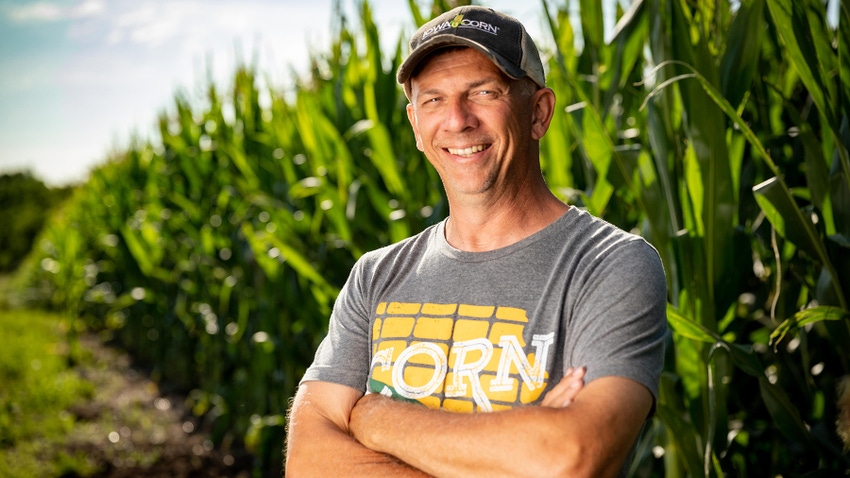
What am I missing about sustainability?
I mean, it sounds like another feel-good buzz word, right? And the way big corporations stumble over themselves, making pledge after pledge to be ‘more sustainable,’ I’m wondering: is this all just lip service to please consumers?
It’s certainly not for Lance Lillibridge. The Iowa farmer had a come-to-Jesus moment in 2008 when a ‘500-year flood’ hit, wiping out parts of nearby Cedar Rapids and the land he farms.
“The amount of rainfall we got that summer was unbelievable, causing billions of dollars of damage,” he recalls. “When we went to harvest the amount of erosion we saw was horrid. We had one waterway you could park a truck in the washout.”
Lillibridge realized: the way he farmed was not sustainable. So he sold all his tillage equipment and dove into reduced tillage with a strip till bar and never looked back. While it took a few years to see results, he loves the crop residue, the higher organic matter, and the lower fertilizer bills. About half his farm now includes cover crops.
But more on that later.
Conservation, a term every row crop farmer understands, is similar to sustainability, with a slight but important twist. Conservation is something you do now to conserve something; sustainability is a set of practices designed to conserve something not only now but the next decade and the next 100 years. You can practice conservation, but it doesn’t necessarily mean it will be sustainable. Let’s just say sustainability is the highest form of conservation, and leave it there.
The big disconnect
After chatting with Lillibridge, it dawned on me: there is a big disconnect between corporate sustainability and farm sustainability. Sustainability means something different to each group.
We may both be missing the mark.
Ask people at the grocery store if they’re reading product labels for sustainable or regenerative practices. More often than not they are checking price, attractiveness, to see if it looks tasty. A handful may buy based on health or nutrition.
“When companies like PepsiCo or Nestle pledge to be more sustainable, I just laugh,” says Lillibridge. “I just care about sustainability on my farm. I want to be able to do the best job I can and make it as good or better the next year and the next decade as it is now.
“Now, if what I’m doing is something those companies like and I can link up with them and capitalize on a premium, it’s great,” he adds. “I think a lot of farmers have the same attitude.”
Many companies say they will invest in supply chain sustainability, but that change does not seem to be trickling down to the farm gate – yet. Robust adoption of sustainable or regenerative practices is difficult for two reasons: misplaced incentives and demographics.
Start with demographics. Most farmers and landowners are older, and few are willing to make big changes at their age. “Why invest thousands to change the way I farm if I’m not the one doing it in 5 to 10 years?” says Lillibridge. “We have to get younger people involved. As farms transition to the next generation, that’s where we need to say there is a different way of doing this and it’s going to be better for you and your kids.”
What about incentives? There is a reason carbon markets are slow to take hold. North Dakota farmer Dan Marquardt told me last week he attended a meeting to learn about carbon markets, but left even more confused than when he walked in. There’s a lot of unanswered questions and uncertainties to go along with less-than-stellar incentives.
“These companies who want to pay farmers $10 to $15 per acre for sustainable practices - we get that kind of swing every day in the market, so it’s not attractive,” says Lillibridge. To add injury to insult, most of the early adopters of sustainable practices aren’t eligible since carbon markets by definition reward change.
“It’s one reason carbon markets aren’t taking off,” adds Lillibridge. “So, there’s a big challenge ahead as far as sustainability is concerned.”
Upside potential
It sounds bleak, but there is positive upside potential for those willing to critically review their farm practices with an eye toward improvement. Two years after switching to strip till “our erosion was slim to none,” recalls Lillibridge. Recently an Iowa-based company called Sustainable Environmental Consultants reviewed his farm for climate smart practices and environmental outcomes. The results were astounding: The Lillibridge farm loses just .34 tons per acre in soil erosion compared to the state average of 5.9 tons per acre and the national average of 4.6 tons per acre.
“It’s amazing,” says Lillibridge. “It’s the equivalent of 59 truck loads of soil.”
The benefits of change kept rolling in. Thanks to better soil health and organic matter, Lillibridge applies about half the amount of fertilizer he once applied to get the same yield. His practices sequester 213 tons of carbon, equal to taking 169 fossil fuel automobiles off the road each year.
The take home message? Sustainability means something different to each of us. But if you’re really sold on making your farm as sustainable as possible, do a self-examination of your practices. Consider what it is you are willing to change. You’re not changing for any company’s sustainability pledge. You’re changing for the future people making a living off the land you farm. Because in the words of the great poet Jim Morrison: no one here gets out alive.
“I encourage guys to think about this on their own farm,” says Lillibridge. “How do I make my farm last for decades and decades?”
I asked North Dakota farmer Dan Marquardt for his definition of sustainability. “I’ve been farming for over 50 years,” he said after a pause. “To me, that’s sustainability.”
I couldn’t have said it better.
About the Author(s)
You May Also Like






